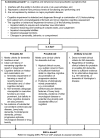A practical algorithm for managing Alzheimer's disease: what, when, and why?
- PMID: 25815358
- PMCID: PMC4369281
- DOI: 10.1002/acn3.166
A practical algorithm for managing Alzheimer's disease: what, when, and why?
Abstract
Alzheimer's disease (AD) is the most common form of dementia and its prevalence is increasing. Recent developments in AD management provide improved ways of supporting patients and their caregivers throughout the disease continuum. Managing cardiovascular risk factors, maintaining an active lifestyle (with regular physical, mental and social activity) and following a Mediterranean diet appear to reduce AD risk and may slow cognitive decline. Pharmacologic therapy for AD should be initiated upon diagnosis. All of the currently available cholinesterase inhibitors (ChEIs; donepezil, galantamine, and rivastigmine) are indicated for mild-to-moderate AD. Donepezil (10 and 23 mg/day) and rivastigmine transdermal patch (13.3 mg/24 h) are indicated for moderate-to-severe AD. Memantine, an N-methyl-d-aspartate receptor antagonist, is approved for moderate-to-severe AD. ChEIs have been shown to improve cognitive function, global clinical status and patients' ability to perform activities of daily living. There is also evidence for reduction in emergence of behavioral symptoms with ChEI therapy. Treatment choice (e.g., oral vs. transdermal) should be based on patient or caregiver preference, ease of use, tolerability, and cost. Treatment should be individualized; patients can be switched from one ChEI to another if the initial agent is poorly tolerated or ineffective. Memantine may be introduced in moderate-to-severe disease stages. Clinicians will regularly monitor symptoms and behaviors, manage comorbidities, assess function, educate and help caregivers access information and support, evaluate patients' fitness to drive or own firearms, and provide advice about the need for legal and financial planning. Review of caregiver well-being and prompt referral for support is vital.
Figures


References
-
- Alzheimer's Association. 2014 Alzheimer's disease facts and figures. Alzheimers Dement. 2014;10:e47–e92. - PubMed
-
- Wimo A, Prince M. World Alzheimer Report 2010: the global economic impact of dementia. London, UK: Alzheimer's Disease International; 2010.
-
- Cummings JL, Cole G. Alzheimer disease. JAMA. 2002;287:2335–2338. - PubMed
-
- Lopez OL. The growing burden of Alzheimer's disease. Am J Manag Care. 2011;17(suppl 13):S339–S345. - PubMed
-
- Alzheimer's Disease International. World Alzheimer Report. 2009. . Available at http://www.alz.co.uk/research/files/WorldAlzheimerReport.pdf (accessed 21 November 2014)
Publication types
Grants and funding
LinkOut - more resources
Full Text Sources
Other Literature Sources

